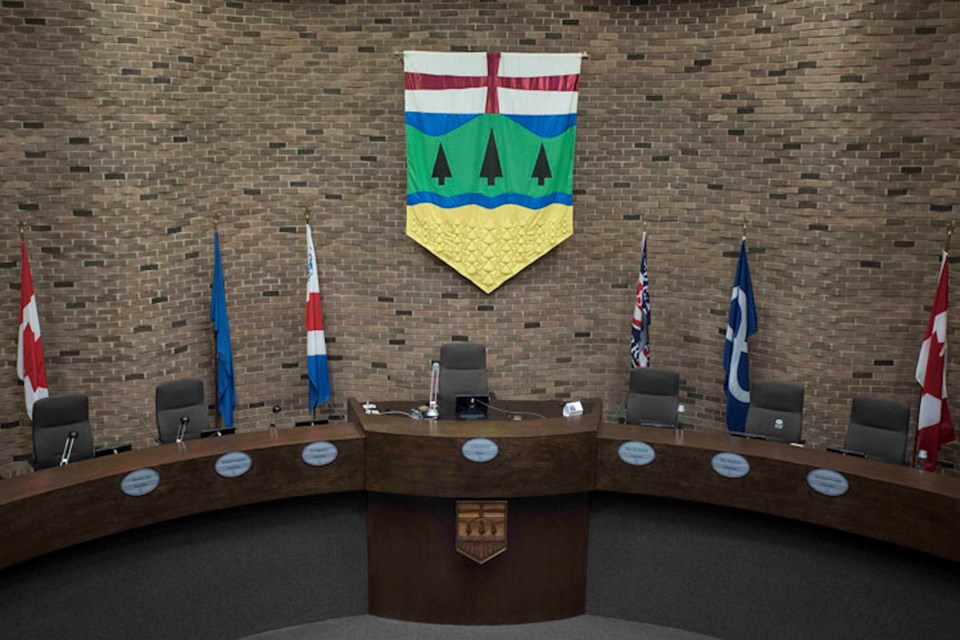St. Albert city councillor Mike Killick has put forward a motion that aims to have mayor and council “make every effort” to attend meetings in person, rather than through Zoom.
The motion, which Killick gave notice for on March 19, would amend council's Meeting Through Electronic Communications policy by adding a section that reads, “councillors shall make every effort to attend council meetings in person, and only attend council meetings via electronic communications due to unforeseen, extenuating, or extraordinary circumstances.”
Killick said he put the motion forward because he thinks in-person meeting attendance is the “best way to represent residents,” it is what council expects of city administration, and because it reduces the chances of miscommunication.
“We as council, I think, have better quality of interaction when we're all in council chambers,” he said.
“We've also recently ... requested that when any of the staff are making a major presentation that they be available in person to make the presentation and address any questions,” Killick said. “And I thought, 'Well, my gosh, we're asking administration to do that, we should also show them the kind of professional courtesy ourselves and attend in person.'”
A recent example of miscommunication during a council meeting, which Killick gave as an example, occurred last month when council met to discuss the urgent $60 million or more servicing project in the city's northeast area. At one point in the meeting, Coun. Sheena Hughes, who attended the meeting through Zoom, was asking a question of a guest speaker when Mayor Cathy Heron tried to interject out of concern that Hughes was sharing confidential information.
Despite Heron's efforts, Hughes wasn't able to hear the interjection and proceeded to ask the question, after which council moved in-camera to have a discussion.
In an interview, Heron also gave the same example as one benefit of having all of council attend meetings in person, although she also said she's supportive of Killick's motion because in-person meeting attendance has many other advantages.
“Probably some of them are obvious ... just the fact that you see each other at a break and have a quick conversation like, ‘How's your dog? How's your day? How's your cat? How're your parents?’ which builds team,” Heron said. “When you don't show up in person that's completely void and gone.”
“I would prefer to see people in person doing their job that they were elected for.”
While many members of council have attended a council meeting through Zoom at one point or another during the current term, whether it was because of being away at a conference or because there were only one or two low-stakes items on a council meeting agenda, Coun. Natalie Joly is the sole member of council to attend nearly every meeting through Zoom.
“I'm not sure where it's coming from,” Joly said of Killick's motion. “We make motions to solve a problem, so I'm not sure what it's geared towards.”
Joly said she knows councillors prefer to attend meetings in person for the social benefits, but she hasn't noticed any issues with virtual attendance when it comes to decision-making.
“In terms of like actual meetings, our job is to listen and make decisions, so I have no issue when councillors are travelling or they are out of the country for a while,” she said. “I haven't seen an issue with that in this term or in last term.”
Joly said she attends meetings through Zoom largely because of her full-time job as the executive director of ElderCare Edmonton, a non-profit organization that supports seniors and their caregivers by offering recreational and social day programs.
“I'm the only person on council who has a job outside of this role, so attending virtually kind of allows me a bit more flexibility where I can work right up till 12:45 p.m. before a meeting, which is absolutely helpful,” she said. “With my new job, I also have to be really cautious about making sure that I'm not places where I'm getting sick, and that's not always possible when you're in council chambers because we don't have any rules about coming to work sick.”
Heron, Joly, and Killick each said enforcing the policy change would either be impossible, or very difficult, if the motion were to pass.
“It's going to be very limited,” Heron said. “Our ability to force any councillor to do anything is very limited [under the Municipal Government Act.]”
“Sanctions that we have in our council code of conduct would be the only method we would have to enforce it.”
Council's code of conduct outlines just 13 potential sanctions that members of council could face, such as issuing a public apology, being removed from a committee appointment, salary reductions, restricted access to city facilities, and more.
Killick said he hopes if his motion is passed, there will be no need to report or enforce the change, as he expects councillors to be responsible for their own actions.
“We're all professional people and truly have the best interests of residents at heart,” he said. “My expectation would be that there would be no requirements to report or create a report or anything like that.”
“I think we're old enough and professional enough that we do it based on self-reporting, and I think once we set the expectation [that councillors are in chambers for meetings], you're on your own to manage and monitor that by by yourself.”
Joly said she doesn't think the policy change would be enforceable whatsoever.



